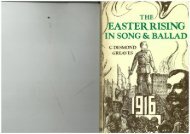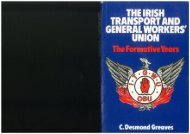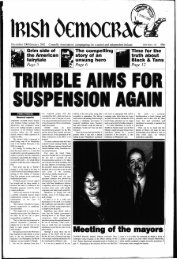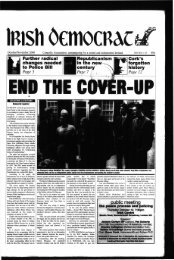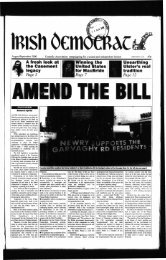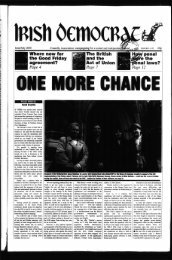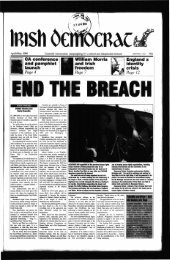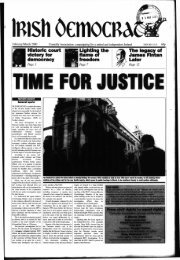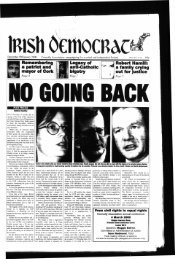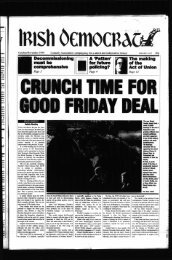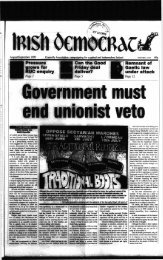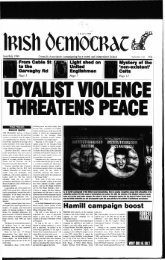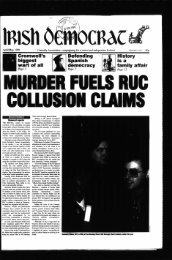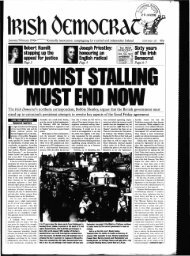Irish Democrat April 1992
You also want an ePaper? Increase the reach of your titles
YUMPU automatically turns print PDFs into web optimized ePapers that Google loves.
4<br />
DEMOCRAT<br />
BOOKS<br />
Somewhere between King Lear and Citizen Kane<br />
IRISH<br />
90NQS<br />
Revisionist song competition<br />
David Granville<br />
Parnell: A Memoir, Edward<br />
Byrne, ed Frank Callanan,<br />
The Lilliput Press, £4.95<br />
pbk; Parnell in Perspective,<br />
ed D George Boyce & Alan<br />
O'Day, Routledge, £ pbk<br />
THE centenary of<br />
Parnell's death in 1991<br />
provided publishers<br />
with the ideal opportunity<br />
both for repackaging and adding<br />
to the tremendous<br />
wealth of written material already<br />
dedicated to "Ireland's<br />
uncrowned king". What<br />
Clues<br />
proportion of these publications<br />
will eventually contribute<br />
to furthering our<br />
understanding of the man<br />
and his times remains less<br />
clear. Fortunately, both of the<br />
above titles do, though in<br />
very different ways.<br />
First published in The <strong>Irish</strong><br />
Independent in October 1898,<br />
Edward Byrne's short<br />
memoir of his friend and<br />
political mentor covers the<br />
brief but tumultuous period<br />
between the ordeal and subsequent<br />
triumph of the Parnell<br />
Commission, and the<br />
split in the Home Rule Party.<br />
Although clearly the work<br />
from the<br />
history of<br />
dissent<br />
Bobbie Heatley<br />
The Dissenting Voice:<br />
Protestant Democracy in<br />
Ulster from Plantation to<br />
Partition, Flann Campbell,<br />
Btackstaff, £12.95 pbk<br />
THIS IS a book which has<br />
raised unionist and neounionist<br />
hackles. I can<br />
think of no higher recommendation<br />
for It. A well-known<br />
unionist historian, reviewing<br />
it in an up-make Dublin<br />
newspaper catering for the<br />
Dublin 4 set, apparently did<br />
not want The Dissenting Voice<br />
to be published at all,<br />
pronouncing it "odd" that<br />
funding for its publication<br />
came from the Cultural Traditions<br />
Programme of Northern<br />
Ireland, "which aims to encourage<br />
acceptance and diversity."<br />
But this book is a major<br />
contribution to the understanding<br />
and acceptance of indigenous<br />
diversity.<br />
Historians, such as the one<br />
referred to, do not object to<br />
th« funding of publications 1<br />
about the Orange Order.<br />
This, by implication, is to<br />
promote acceptance and understanding,<br />
despite the fact<br />
that Orangeism is intrinsically<br />
sectarian, divisive, aggressive<br />
and intolerant — although,<br />
on an individual basis, this<br />
writer has known many goodnatured<br />
Orangemen. It is a<br />
peculiar feature of life in<br />
Northern Ireland that Orangeism,<br />
as a credo, can transform<br />
such people when they<br />
come together as a political<br />
group.<br />
Dr Flann Campbell's book<br />
outlines the history of northern<br />
Protestants who were not<br />
Orange-Tories and it<br />
describes, often with useful<br />
statistical material, the context<br />
in which they strove to<br />
bring together Ihe diverse elements<br />
of the <strong>Irish</strong> nation.<br />
According to the inverted<br />
logic of unionism, this is to<br />
"stir up ancient fires", as the<br />
Dublin newspaper review<br />
was headlined. Given the conflagration<br />
that unionism has<br />
created in contemporary<br />
Northern Ireland, that assertion<br />
is very rich indeed. The<br />
on-going carnage in the<br />
North is a direct legacy of<br />
Unionism/Orange-Toryism<br />
which, as Dr Campbell<br />
demonstrates, is the inveterate<br />
enemy of Protestant<br />
democracy and radicalism.<br />
This does not stop our<br />
Unionist logician from<br />
proclaiming, straight-faced,<br />
that this is "an odd time to<br />
publish such a book." Again,<br />
the hankering to suppress.<br />
To remind Protestants of<br />
of a dedicated and admiring<br />
lieutenant, the nature of their<br />
relationship and Byrne's journalistic<br />
talents have combined<br />
to produce a document<br />
which is both historically significant<br />
and highly readable.<br />
As editor of the Freeman's<br />
Journal, Byrne played a major<br />
role both in disseminating<br />
and popularising Parnell's<br />
political creed and in contributing<br />
to the creation of<br />
the Parnell myth in Ireland.<br />
Parnell's understanding of<br />
the rapidly growing powers<br />
of the popular press in<br />
Britain and Ireland, and his<br />
judicious courting of media<br />
attention, lead editor Frank<br />
Callanan to describe the<br />
Home Rule Party leader as<br />
"the first media celebrity of<br />
modern politics" in a<br />
postscript to the memoir.<br />
Bearing this in mind, the<br />
reader would be wise to<br />
heed the caution concerning<br />
"literary placements" such as<br />
Byrne's, in Wj McCormack's<br />
preface: "Parnell operated<br />
somewhere between King<br />
Lear and Citizen Kane. All<br />
memoirs of him should be<br />
valued, and suspected."<br />
The question of Parnell's<br />
relationship with the press is<br />
also examined by James<br />
I It's Deculiar how they change when they get together politically<br />
their forebears such as Henry<br />
Joy McCracken, Jamie Hope<br />
and William Drennan, to<br />
mention just a few of the personalities<br />
featured in this<br />
book, all of whom sought to<br />
create in Ireland a "brotherhood<br />
of affection" in place of<br />
friction and dis-union, is somehow<br />
to exacerbate the northern<br />
situation. Those of us<br />
who are born and grew up in<br />
the Protestant side of the community<br />
in the North and<br />
who, despite unionist efforts<br />
to keep us in the dark,<br />
managed to learn something<br />
of Protestantism's cultural<br />
diversity — to include<br />
republicanism — are not likely<br />
to be surprised at the<br />
aforementioned example of<br />
perverted and convoluted<br />
thinking. It is a hallmark of<br />
unionism.<br />
Our unionist reviewer<br />
then goes on to squirm at the<br />
mention of certain words in<br />
Dr Campbell's excellent book<br />
such as "liberal'', "radical",<br />
"democratic" and "freedom.".'<br />
Dr Campbell is accused of<br />
using these as if "they were<br />
guaranteed by the Weights<br />
and Measures Of ; ce, and not<br />
just the expression of his own<br />
views."<br />
Here we get another example<br />
of the unionist psyche,<br />
the compulsion to obfuscate.<br />
Unionism habitually defines<br />
the concepts described by<br />
these words in a manner<br />
decidedly at variance with<br />
what everyone else understands<br />
them to mean. With<br />
this usage they do indeed become<br />
nothing more than the<br />
expression of unionism's<br />
"own (perverse) views". For<br />
everyone else, however, these<br />
words do have an objective<br />
meaning which is not too difficult<br />
to comprehend.<br />
In The Dissenting Voice, it<br />
is the latter objective interpretation<br />
of the words that<br />
Dr Campbell employs. His<br />
definition of the "democracy"<br />
is the same as that of Wolfe<br />
Tone and the United <strong>Irish</strong>men<br />
— the labouring masses,<br />
undifferentiated as to ethnic<br />
or religious background (for<br />
the purposes of discrimination),<br />
who owned little or no<br />
property. At one stage, a<br />
rising bourgeoisie in Ireland<br />
was included in this<br />
democracy. The opponents of<br />
.democracy ,werethe plwndering<br />
English/Britishcolonisers<br />
whose garrison, for much of<br />
thepenod covered, was th«<br />
numerically small class of<br />
landed magnates who, in<br />
return for their services to the<br />
colonisers, were protected<br />
from being overthrown by<br />
the democracy.<br />
Dr Campbell<br />
demonstrates clearly that<br />
Loughlin in Parnell in Perspective,<br />
although the similarities<br />
between the two publications<br />
end here.<br />
This collection of essays<br />
by academics working in<br />
England, Ireland and Wales<br />
attempt to cover aspects of<br />
both "the man and the myth"<br />
and is divided into two sections.<br />
The first deals with<br />
Pamell's relations with the<br />
Catholic Church, colleagues<br />
such as Davitt and O'Brien,<br />
Farnell as a nationalist, and<br />
his impact on British politics.<br />
This is followed by essays examining<br />
Parnell's political<br />
Orange-Unionism had its<br />
origination in this antidemocratic<br />
alliance of class<br />
forces and that because of<br />
this fact it is intrinsically reactionary.<br />
The later transmutation<br />
of the big property<br />
autocracy to include a new<br />
regressive native northern<br />
bourgeoisie, did not alter the<br />
nature of the beast. The<br />
danger to it of expanding<br />
electoral franchises was<br />
coped with in the north by<br />
employing the methods of<br />
populism which, for the<br />
benefit of any unionists or.<br />
neo-unionists who may be<br />
reading this, is not the same<br />
as democracy.<br />
Populism in the northern<br />
context meant differentiating<br />
and dividing the working<br />
people on the basis of<br />
religion so as to attach a<br />
majority section to the<br />
autocracy politically. Historically,<br />
the vehicle for achieving<br />
this objective was — and<br />
is — the Orange Order.<br />
Simultaneously with this<br />
stratagem, and as an indispensable-pert<br />
of if/ went discrimination<br />
detrimental to<br />
CatlMte woekwg people in<br />
the main and systematic<br />
repression of Unionism's<br />
dogne or another represented<br />
the interests of the<br />
country's national democracy.<br />
and economic outlook, the<br />
factors behind his charismatic<br />
appeal, and his portrayal at <<br />
the hands of essayists,<br />
novelists and biographers.<br />
In-addition to essays by<br />
the editors D George Boyce<br />
and AUuvO'Day, and James<br />
Loughlfli, contributors include<br />
Paul Bew, Philip Bull,<br />
Anthony Claydon, Sally War<br />
wick-Haller, Michael Hurst,<br />
John Kelly, Liam Kennedy<br />
and jCJ Woods.<br />
Yet despite the academic<br />
nature of this book, there is<br />
much there which will prove<br />
rewarding to the general<br />
reader.<br />
Dr Campbell further<br />
pointsout that in this<br />
unionist all-classes alliance,<br />
the top dog was — and still<br />
remains — an outside element:<br />
the English governing<br />
classes who are the dominant<br />
influence within the British<br />
state. If unionist politics is, !<br />
therefore* to be included as a<br />
component of the culture of<br />
Ireland, then it is an exotic<br />
plant imposed from outside<br />
this country.<br />
Dr Campbell does not contend<br />
that every Protestant<br />
radical and dissenter down<br />
through the decades understood<br />
thematter precisely in<br />
this way, but the more politically<br />
advanced of them certainly<br />
did. Others, perhaps<br />
because of pressures which<br />
.we wiS rtever now be able to<br />
discover, were sometimes<br />
lessthan. separatist. Neverthetheir<br />
stances on the sorialistruggles<br />
of their days<br />
had separatist implications in<br />
quite a few cases.<br />
Timesarechanging and<br />
Apolitical and economic<br />
conditions which gave rise to<br />
British unionism in Ireland<br />
are undergoing a metamorphosis:<br />
DrCampbell's<br />
metftedology will assist the<br />
reader to assess whether or<br />
not the old-time form of<br />
unionism will be able to<br />
with&tand the stresses and<br />
strains to which the different<br />
emerging Europe will subject<br />
it,. He further demonstrates<br />
thatProtestantism and<br />
unionism are not<br />
synonymous and that they<br />
have not always cohered in<br />
the past, at least without a<br />
gnat deal of effort to "win<br />
the consent" of Protestants<br />
for unionism.<br />
The crisis in the North<br />
may notbe the most>critical<br />
for the-present British state —<br />
perhaps Scotland will turn<br />
out to be that—but it is certainly<br />
the most shameful.<br />
Something new urgently<br />
needs to be done and there is<br />
more than one clue in Dr v<br />
Campjbell's book as to what<br />
thM newness oughtto consist<br />
9M*frrecouu*mdMhreading<br />
for the Dublin 4 set as<br />
well.<br />
&qpfcrii)9gp>und that has<br />
not been o»wtra versed in<br />
the past, The Dissenting Voice<br />
-isan 1<br />
names of Ireland's northern<br />
Protestant democrats.<br />
AS PART OF THE first <strong>Irish</strong> <strong>Democrat</strong> Eu-revision song contest<br />
— thanks to Peter BerceSford Ellis for that joke —you were<br />
asked to supply suitably craven words to songs of <strong>Irish</strong> rebellion<br />
in an attempt to do for musical culture what the neocolonial<br />
school of intellectuals have done for the nation's<br />
history.<br />
Although there's only room to print five of your efforts,<br />
thanks to all those who took part — although if s a disappointment<br />
nobody took up the challenge of Come Out You Black and<br />
Tans (Let Me Shake You By The Hand).<br />
No prizes were mentioned when the competition was<br />
opened in January — perhaps that might have spurred more of<br />
you to have had ago. So to reward the musical revisionists Who<br />
made their contrtinitions with no financial gain in view, there is<br />
Belfast as one contestant suggested. To Jack Bennett for a splendidly<br />
sarcastic pair of new songs to old tunes goes a copy of nathe<br />
Rearguard. And yes indeed, Mike Melly, none of the following<br />
should ever be sung on The Late, Late Show.<br />
Take It Down<br />
from the Mast<br />
Tune: Red River Vatley<br />
TAKE IT DOWN from the mast by consensus,<br />
It's a flag only sub-versives claim,<br />
It's entirely against ecumensus,<br />
And ifs all for our troubles to blame.<br />
Like crur anthem, it smacks trf sedition,<br />
And those Articles dread Two and Three!<br />
We'll consign the whole lot to perdition,<br />
Together with Mother Machree.<br />
And the Angelus bell is provoking, .. v., :<br />
Offensive to broadcast it, tooV'; ,«!<




